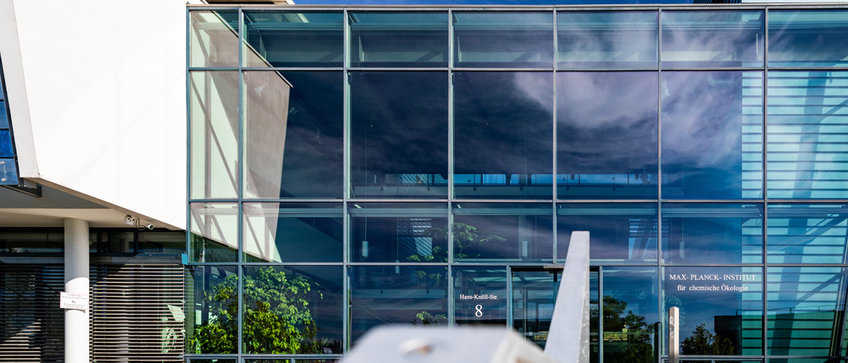
Short Portrait of the Max Planck Institute for Chemical Ecology
The Max Planck Institute for Chemical Ecology investigates the chemical communication between different organisms - plants, insects and microbes. It is located at Beutenberg Campus and has 5 Departments and 7 independent Research Groups and offers central service for NMR, mass spectrometry, statistical analyses and microscopic imaging. The institute has about 350 coworkers including guests and students.
Biochemistry
The Department of Biochemistry investigates the chemical defenses that plants deploy against their herbivorous enemies. The research goal is to determine which chemical compounds actually protect plants, how they act against herbivores, how the production of defenses in plants is regulated, and why plants seem to have evolved such a large diversity of defensive compounds. Current projects focus especially on the defenses of trees and other woody plants against aphids and beetles. The defensive metabolites under study include a variety of terpenoids, phenolics, alkaloids and glucosinolates. The latest methods of biochemistry as well as analytical chemistry, molecular biology and field ecology are applied. Director: Prof. Dr. Jonathan Gershenzon
Evolutionary Neuroethology
The Department of Evolutionary Neuroethology studies odor-directed behavior and the underlying neurobiological substrate in insects from a functional and evolutionary perspective. Studies are performed in two main systems: drosophilid flies and sphingid moths. The main objective is to understand the evolution of olfactory functions. By studying related insects and other animals (e.g. crabs) living under different ecological conditions it is possible to understand how habitat and food-choice affect the sense of smell. The department has a variety of technical facilities (wind tunnels, flywalk system) for the quantification of behavioral patterns. Director: Prof. Dr. Bill S. Hansson
Insect Symbiosis
The Department of Insect Symbiosis investigates how insects adapt to challenging environments or food sources, with a particular focus on ecological traits conferred by microbial symbionts. The main goal is to understand the evolutionary origins, ecological implications, and the chemical and molecular basis of insect interactions with mutualistic microbes, as well as with antagonists and the insects’ food plants. In order to derive general principles governing these interspecific interactions, we study a broad spectrum of insect taxa including diverse species of beetles, bugs, wasps, and flies. Director: Prof. Dr. Martin Kaltenpoth
Natural Product Biosynthesis
The Department of Natural Product Biosynthesis studies specialized plant metabolites with evolutionary and pharmaceutical importance. Researchers in the department develop approaches to understand and engineer the chemistry and biology of plant metabolism. Monoterpene indole alkaloids and iridoids are a particular focus. Director: Dr. Sarah E. O'Connor
Research groups
The promotion of young scientists is a priority at the Max Planck Institute for Chemical Ecology. Highly skilled young researchers are given the opportunity to conduct their own research as heads of Max Planck Research groups. These appointments span a limited number of years and are funded by the Max Planck Society or external sources.
IMPRS
An important task of the institute is training young researchers in modern techniques of chemical ecology. In 2005 a special graduate program, the International Max Planck Research School, was established that offers the possibility for highly qualified young researchers to conduct their research in an international atmosphere.
Scientific Service
The Institute has four core facilities providing scientific support in the fields of NMR, small molecule analysis based on mass spectrometry, statistics and microscopic imaging techniques.